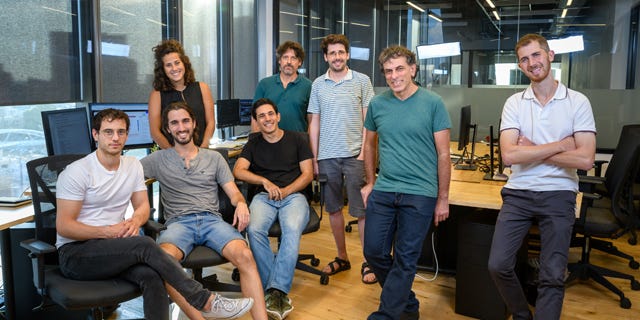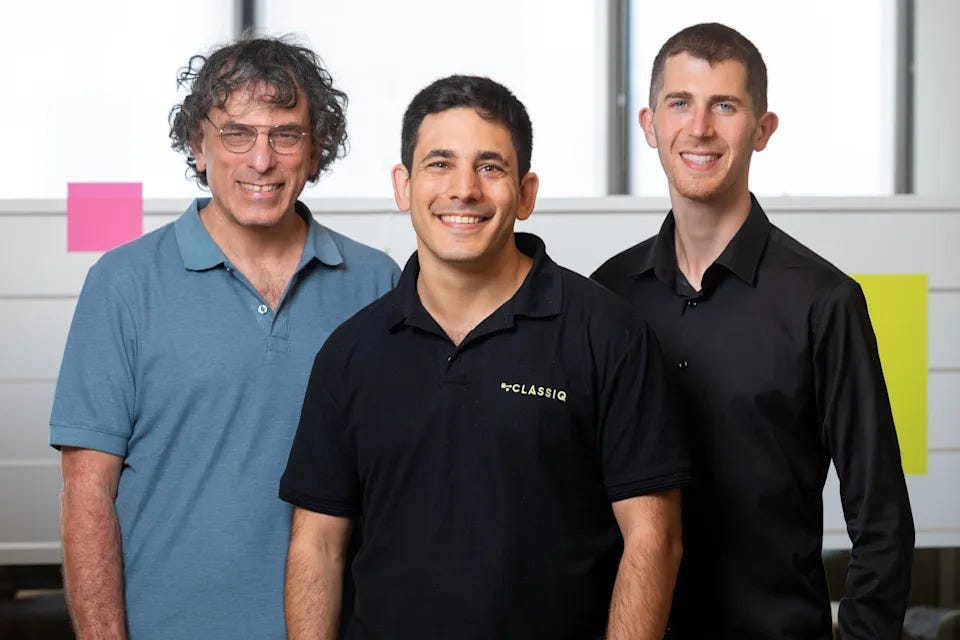The Microsoft of Quantum
Classiq just raised $110 million in a major funding round for Quantum software.
Classiq has really put Israel on the map in Quantum software, do remember back in the day Microsoft was a major backer of Classiq and is among its most likely M&A destinations.
Classiq has built a software platform to facilitate programming for quantum computers
Classiq has raised $110 million in Series C funding, reportedly the largest ever for a quantum software company, bringing its total funding to $173 million.
Classiq has a very diverse group of investors at it has matured as one of the key Quantum startups in Israel. The financing round was led by global venture capital fund Entrée Capital, with participation from Norwest, NightDragon, Hamilton Lane, Clal, Neva SGR, Phoenix, Team8, IN Venture, Wing, HSBC, Samsung Next and QBeat.
In the words of CEO and co-founder Nir Minerbi, Classiq is building “the Microsoft of quantum computing” – the software stack that powers real-world quantum applications. Calling yourself the Microsoft of Quantum really does sound good on paper, even if real Quantum computers don’t exist yet with millions of qubits to be truly useful.
That’s not to say that their partnerships aren’t growing however; Citi, BMW Group, and Deloitte are just a few organizations that depend on them, and Classiq is deeply embedded across hundreds of global academic institutions.
🚀 Quantum Coding Just Leveled Up
Classiq was founded in December, 2019 (2020 on many websites) so they are developing well for being just five years old. The company plans to scale its commercial and R&D operations globally, positioning itself as a foundational player in the quantum ecosystem with customers with increasing partnerships.
Founded by CEO Nir Minerbi, CTO Yehuda Naveh and his son CPO Amir Naveh, Classiq has developed a software operating platform that works across all major types of quantum hardware. The platform is tailored to help data scientists, computational scientists, and engineers work on quantum algorithms and build programs and applications with high-performance computational power that hold the promise of speeding up solutions to today’s most complex real-world problems.
The startup also had 2022 backing from the likes of the current Intel CEO Lip-Bu Tan, Hewlett Packard Pathfinder, the venture capital program of Hewlett Packard Enterprise (HPE); Phoenix, a $60-billion insurance company; Spike Ventures, a Stanford alumni investor group; and Samsung NEXT, the investment arm of Samsung are new investors in the company. So there aren’t just Microsoft connections here there are many others as well.
Classiq’s backers have a lot of interesting things to say about the startup.
Classiq has a very Diversified List of Backers
If you curious to look up the backers on LinkedIn this may help: Entrée Capital, Norwest, NightDragon, Hamilton Lane, Clal, NEVA SGR, Phoenix, Team8, IN Venture, Wing Venture Capital, HSBC, A&E Investments, Samsung Next, OurCrowd, Qbeat Ventures, and others.
Israeli entrepreneurs of course are skilled at sales and Nir is positioning Classiq as a great Quantum acquisition target in the years ahead, or to go public.
“We are building the Microsoft of quantum computing – a software layer that powers the next generation of quantum applications, just as Microsoft did for classical computing,” said Classiq’s Minerbi.
Classiq is really well known to Quantum developers and thus have quite an active community. The company says its platform provides advantages such as accelerated onboarding, enabling developers and data scientists get to grips with quantum computing much faster than they otherwise would.
Classiq in a Nutshell
The platform simplifies the creation and design of complex quantum circuits and is geared to allow businesses and organizations without in-house quantum experts to build quantum applications that can resolve complex calculations in areas such as the automotive industry, automation, finance, and drug discovery in the pharmaceutical industry.
Automotive industry
Automation
Finance
Drug Discovery
Pharma
Curiously a lot of Classiq’s best partners are in the Automotive industry at present. Classiq is also smaller and leaner than I had imagined. Classiq, which employs 65 people, plans to double its workforce over the coming year.





